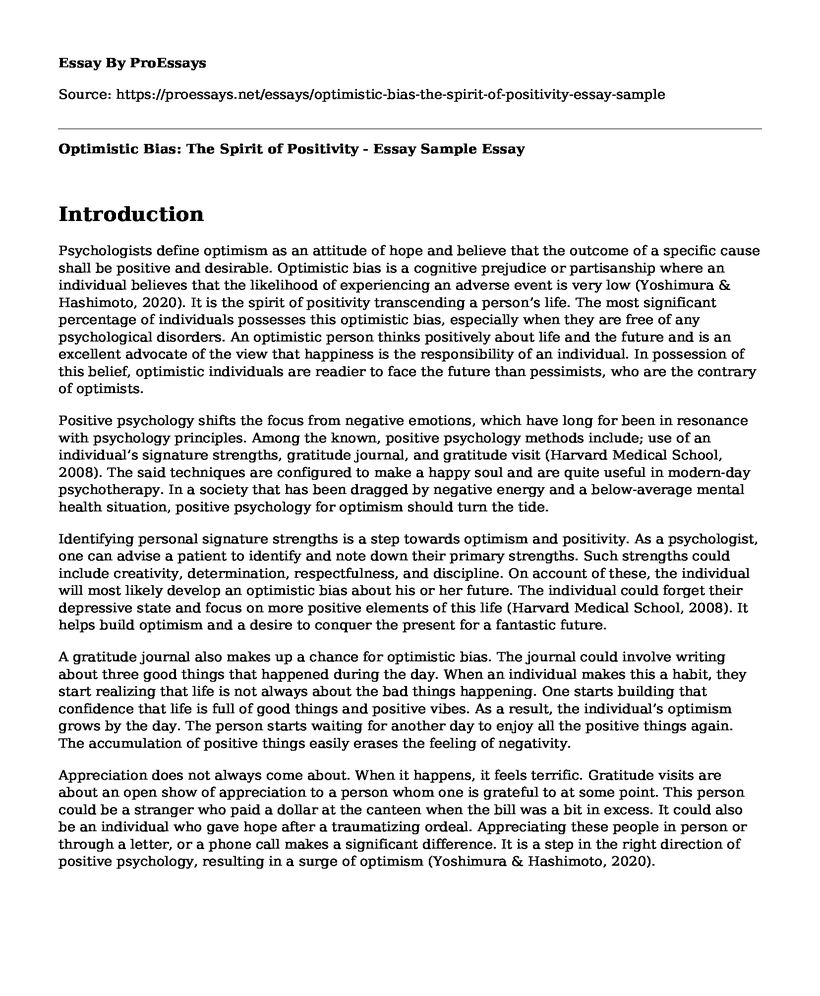Introduction
Psychologists define optimism as an attitude of hope and believe that the outcome of a specific cause shall be positive and desirable. Optimistic bias is a cognitive prejudice or partisanship where an individual believes that the likelihood of experiencing an adverse event is very low (Yoshimura & Hashimoto, 2020). It is the spirit of positivity transcending a person’s life. The most significant percentage of individuals possesses this optimistic bias, especially when they are free of any psychological disorders. An optimistic person thinks positively about life and the future and is an excellent advocate of the view that happiness is the responsibility of an individual. In possession of this belief, optimistic individuals are readier to face the future than pessimists, who are the contrary of optimists.
Positive psychology shifts the focus from negative emotions, which have long for been in resonance with psychology principles. Among the known, positive psychology methods include; use of an individual’s signature strengths, gratitude journal, and gratitude visit (Harvard Medical School, 2008). The said techniques are configured to make a happy soul and are quite useful in modern-day psychotherapy. In a society that has been dragged by negative energy and a below-average mental health situation, positive psychology for optimism should turn the tide.
Identifying personal signature strengths is a step towards optimism and positivity. As a psychologist, one can advise a patient to identify and note down their primary strengths. Such strengths could include creativity, determination, respectfulness, and discipline. On account of these, the individual will most likely develop an optimistic bias about his or her future. The individual could forget their depressive state and focus on more positive elements of this life (Harvard Medical School, 2008). It helps build optimism and a desire to conquer the present for a fantastic future.
A gratitude journal also makes up a chance for optimistic bias. The journal could involve writing about three good things that happened during the day. When an individual makes this a habit, they start realizing that life is not always about the bad things happening. One starts building that confidence that life is full of good things and positive vibes. As a result, the individual’s optimism grows by the day. The person starts waiting for another day to enjoy all the positive things again. The accumulation of positive things easily erases the feeling of negativity.
Appreciation does not always come about. When it happens, it feels terrific. Gratitude visits are about an open show of appreciation to a person whom one is grateful to at some point. This person could be a stranger who paid a dollar at the canteen when the bill was a bit in excess. It could also be an individual who gave hope after a traumatizing ordeal. Appreciating these people in person or through a letter, or a phone call makes a significant difference. It is a step in the right direction of positive psychology, resulting in a surge of optimism (Yoshimura & Hashimoto, 2020).
Conclusion
In conclusion, the tenets of positive psychology have created an amazing frontier in dealing with psychological disorders. Patients can get assistance to view life in a more positive note, rather than trying to bin the negative energy in their life. The primary concept of positive psychology is leading a happy life, which is also fulfilling and healthy (Yoshimura & Hashimoto, 2020). It is centered on the dimensions of happiness; pleasant, good, and meaningful life. In the application of positive psychology, the population should shift from a majority in moderate mental health to flourishing mental health as illustrated below. The first illustration (Figure 1) is when traditional psychotherapy is applied, and the second illustration (Figure 2) is where positive psychotherapy is used.
Figure 1: Traditional Psychotherapy
References
Harvard Medical School. (2008). Positive psychology in practice - Harvard Health. Harvard Health. Retrieved 7 June 2020, from https://www.health.harvard.edu/mind-and-mood/positive_psychology_in_practice.
Yoshimura, S., & Hashimoto, Y. (2020). The effect of induced optimism on the optimistic update bias. BMC Psychology, 8(1). https://doi.org/10.1186/s40359-020-0389-6
Cite this page
Optimistic Bias: The Spirit of Positivity - Essay Sample. (2023, Aug 27). Retrieved from https://proessays.net/essays/optimistic-bias-the-spirit-of-positivity-essay-sample
If you are the original author of this essay and no longer wish to have it published on the ProEssays website, please click below to request its removal:
- Happiness According to Aristotle
- Essay Sample on Writing Skills
- Preventing Harmful Drug Use Within the Community - Annotated Bibliography
- Essay Example on a Haven for Hope: Therapy, Medical Care and Detox for the Homeless
- Essay Sample on Equal Rights for Women & LGBTQs: A 19th Century Movement
- Essay Example on US Security Concerns Rise After Terror Attacks
- Essay Example on John Stuart Mill on Utilitarianism: Happiness & Comfort







